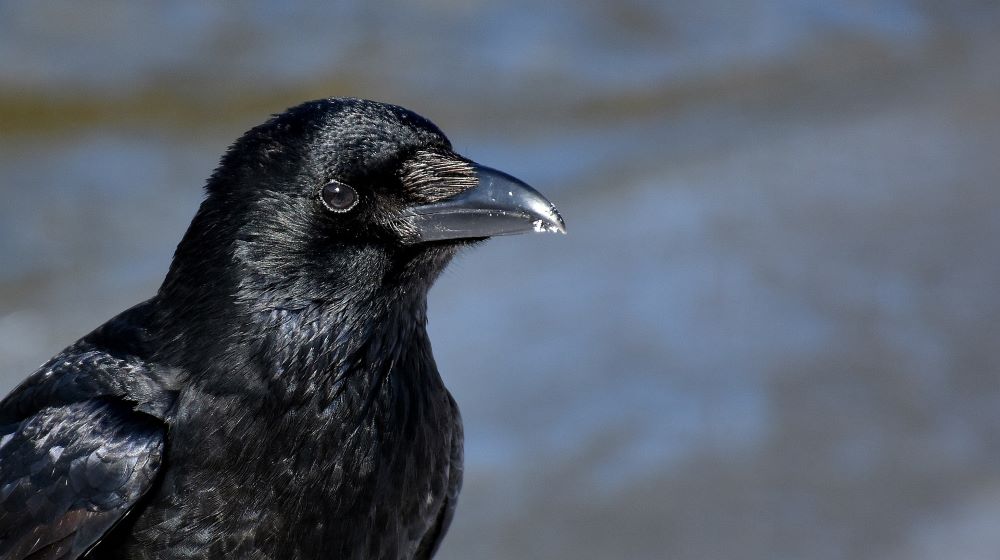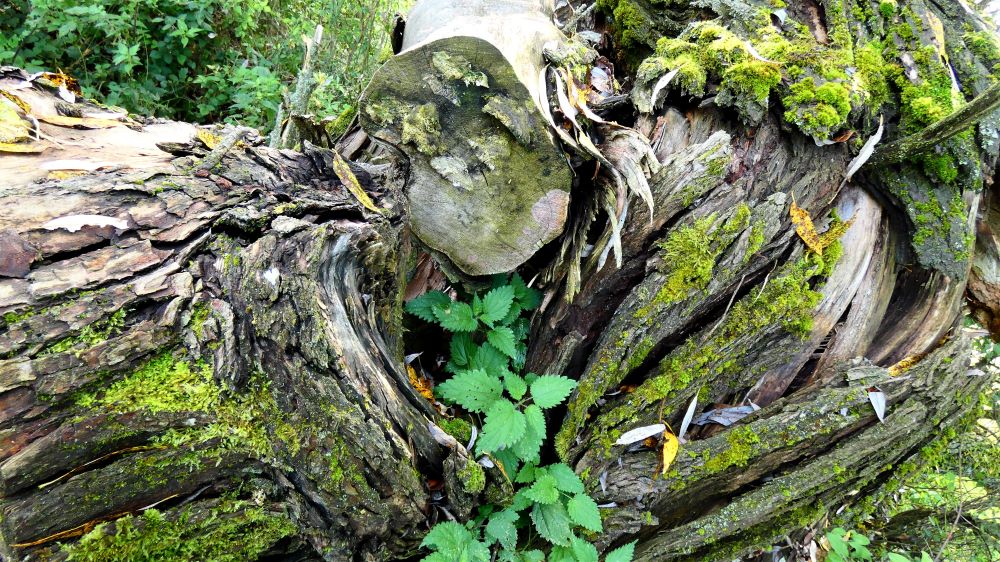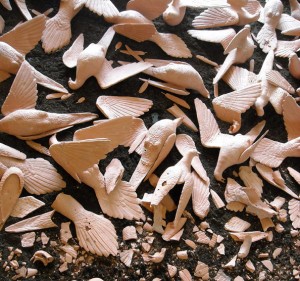I had seen fog as it spread from tree to tree in an alder thicket, and as it slowly curled around a hilltop gun placement; I had seen from above, as it lodged in the trough of a valley far below, and as it steamed from north to south on a mountain pass; seen it as it layered on the asphalt road on my way homewards; I had also seen fog descending and lifting within just minutes, as well as choking smog that did not clear for weeks; on the shore of the Simpson Straits, in the Northwest Territories, I have stood in fog so thick that I could see only as far as the tip of my nose. But never before, anywhere, had I seen anything as dense as the fog inside me that summer.
 I had seen fog as it spread from tree to tree in an alder thicket, and as it slowly curled around a hilltop gun placement; I had seen from above, as it lodged in the trough of a valley far below, and as it steamed from north to south on a mountain pass; seen it as it layered on the asphalt road on my way homewards; I had also seen fog descending and lifting within just minutes, as well as choking smog that did not clear for weeks; on the shore of the Simpson Straits, in the Northwest Territories, I have stood in fog so thick that I could see only as far as the tip of my nose. But never before, anywhere, had I seen anything as dense as the fog inside me that summer.
I had seen fog as it spread from tree to tree in an alder thicket, and as it slowly curled around a hilltop gun placement; I had seen from above, as it lodged in the trough of a valley far below, and as it steamed from north to south on a mountain pass; seen it as it layered on the asphalt road on my way homewards; I had also seen fog descending and lifting within just minutes, as well as choking smog that did not clear for weeks; on the shore of the Simpson Straits, in the Northwest Territories, I have stood in fog so thick that I could see only as far as the tip of my nose. But never before, anywhere, had I seen anything as dense as the fog inside me that summer.
By July I was simply convinced that Linna had left me—just like that, tough titties, that’s the ball game, over and out, cut, basta! I couldn’t imagine why she would come, unless it was to kill me. I could think of nothing else. A heat-wave was raging outside, the very walls of the houses sweaty, the trees wilting, lice gasping, window shutters melting, blades of grass, flies and leaves sticking to each other. The sky was bubbling up into blisters, and forests with skin cancers were panting, but I was shivering, like someone stranded on an ice field in the Beaufort Sea. A brief but violent storm every afternoon, towards four o’clock, would give the landscape some respite from the melting. Sometimes gale-force winds brought jagged forks of lightning. This would always be followed, every damned day, by a tranquil, tepid, steaming twilight. Shuddering with cold, I would watch as lizards basked amid the drying spikes of lavender.
I have no idea how long I did not eat. In any event, when I had given no sign of life by the middle of July my mother dropped by. She happened to be passing that way and peeked in, just in case I was at home, you never knew, Morgen being so dumb. I had been feeling chilly and was sleeping. Mother came to a standstill among the weeds that were pushing up by the front gate, the look on her face so horror-struck that it took me long seconds to recognise her. When I finally snapped to and realised that the frightening stranger who was disrupting my shivering was Mother, all I asked was, “What do you want?” Mother responded with a question of her own: “Have you any idea what you look like?… When did you last eat anything?” I was unable to answer. Up until that point, it had not entered my mind that I was not eating. I never felt hungry; just freezing. Mother, in her desperation, said that it was not normal, one could even die of it, but in that case it would be no good my saying it was her fault. I reassured that that as far as that was concerned, I wouldn’t.
I waited for Linna for three months. It wasn’t the way one usually waits, though: I did nothing else, just waited, for almost a hundred days. I seemed to recall that we might even have discussed a time when she would come. At the beginning of July—the “agreed point in time”—I sat for three days and three nights without sleep, barely moving, by the window. behind closed shutters, breaking down even the slightest noise to its constituent particles. For three days cars came and went; storms came and went, the twilights, evenings, swallows, hedgehogs and beetles; a wind rattled the doors of the half-finished house; a bucket of plaster that had been left dangling on a rope, pulled halfway between the ground and the upstairs floor, swung back and forth like a pendulum; the foliage of the magnolia rustled, the planks by the entrance creaked; things would plop down from the trees every now and then—but no Linna. Through a combination of despair and sleeplessness, I must have lost my mind. To start with there were appalling temptations; plans, brainwaves, tormenting urges, and in the end, apparitions: flame-red figures sitting on the trees, on the furniture, the walls—I haven’t seen anything so beautiful since! They were wonderful: alluring, benign, pleasant and bright red! Most certainly they came, though admittedly not so much to me as for me. They waved, They understood everything—at last someone who did!—so they said not a word, just swarmed across the room, the yard, the tree branches; their tiny legs dangled from the loose gutter, lolled about in clumps on the terrace; there were places where they were scattered casually in a row on the lawn, like a necklace string of inwardly glowing rubies, popping up now here, now there from a molehill or from behind a tree trunk; they teemed like ants in nooks and crannies, and hardly any larger, whereas in another place, in the gateway, would stand a lofty figure, over sixty feet high, with shorter ones seated on his shoulders, and on them in turn, pocket demons of some sort! And ever more of them were pouring and climbing out from behind the lapels, the belt, the mouth, the nose, every one of them most agreeable, attractive and good-looking. Good-humoured. And every one of them, big or small, lazing about or swarming together, were looking at me and beckoning with a slow, unctuous gesture: “Come! Come now! Don’t wait and don’t fall asleep! Come along with us!” I was well aware that they were the angels of demise, but who have credited that the cul-de-sac of death was so exquisite, so inviting, so reassuring and salutary! So pleasantly scary that I forgot to die and simply fell asleep.
Nobody inquired after me until the end of August. My half-sister and half-brother, Selma and Norman, did not so much as cross my thoughts; Linna was all I had on my mind. Mother came over on two occasions at the end of the month; she brought something to eat, but I could barely get a bite down. Chewing was painful, swallowing was sheer torture. She threatened to have me locked up in the loony bin if I didn’t eat. So I threatened her back that when I got out there would be hell to pay. She did not come after that.
Crazy as I was, I would take the nobly simple way out and croak there—that is, if I was allowed. During the night of September 4th, though, I dreamed that I had been reminded of Norman, whom I couldn’t abide; indeed, he had always repelled me: the very sight of him, his voice, his smell—everything that was part of him. I dreamed that I was eating supper with Mother. We were up to the waist in tepid mushy peas, sitting like two old-age pensioners in a thermal bath. The table top was clean, however: although the corners were dipping into the soup, the table-cloth was a crisp white. There was a fine dinner service of Meissen china, with silver spoons. In the centre was a samovar, a ladle resting on a dinner plate, which we used from time to time to scoop up from the thick pulp from the room. We ladled it out and ate in leisurely fashion, kept on ladling it out and eating, over and over again; we were not hungry, but we did not get our fill either. When I managed to dribble some of the mush onto the tablecloth, Mother, in best devotional manner, declared under her breath, “Easy now, Morgen!” and that inflection brought Norman to mind. Not much later, Mother—now in a breezy, worldly tone of voice—asked me to go and pay Norman a visit in hospital tomorrow, and I was to take a change of clean clothes and oranges, ask him how he was, and had he been told anything yet about the operation. Grudgingly as always, I took note of Mother’s wishes, and the next day I got dressed, stowed into a bag the parcel for Norman and Mother’s letter to the doctor who was treating him, and got on the bus. I spent a tedious half-day being jolted around, already making plans for the journey back: what I would do afterwards: where I would go to hide away so as not to meet up with Mother or Norman for months. In all honesty, I would rather not go in to see him, just give the parcel to the nurses: “There you are! These are his clothes and some oranges. Give him one whenever you feel like it! This is Mother’s letter for the doctor! That’s all right, isn’t it? (who was going to tell me, of all people, that it would be a great nuisance?) Great! Bye-bye! Then back out the door, off to the bus stop. God forbid I should ever see the place again! Toddlers tottering around, wheelchairs, wooden crutches hanging on the loo door, and the stink that assailed my nose—the smell of the sort of medicines that are doled out five times daily to the incurably sick.
A familiar nurse duly came, which pleased me greatly. It all went off smoothly: I handed her the parcel and the letter, just as I had foreseen on the bus, and I was already striding towards the exit when I sensed an odd pull and a powerful feeling of unease, and the door to one of the wards was pushed open by a draught just as I was passing. Norman was sitting up in bed opposite the door, perched in what was a failed attempt to cross his legs, staring at me as never before. He was radiating utter amazement and humiliating love. A strong, steady draught was blowing from his direction; my hair was ruffled and my T-shirt fluttered. It slowly gathered strength till I had to lean forwards in order not to be blown down. Then there came a moment—I stood for a long time in the diabolically strong draught—when I did not feel just the love in it; not just the longing for those who are healthy, do not shit their pants, can read and write and play in the playground, tug girls’ pigtails and skirts, but an outpouring of intelligence, of complete, total, absolutely solitary self-consciousness. A sense that Norman was not at all stupid, just different! And he was starving and sinking fast! Yes, he would die of starvation within hours, because he could never get down a morsel of what the others were given more or less regularly, if only as scraps. And not only did he sense that he had never received any of that, but he knew it as well, and that was a cruel dilemma!
I was so sorry for him that I felt compelled to go in and look at him with love and forgiveness, and as I stood there, quite close to him, I couldn’t help smoothing down the hair on his shaggy head, whereupon he fiercely grabbed on to my arm, almost falling off the bed as he pressed his arm on the bars, and in my dream I then saw something that no one had ever seen before: Norman’s eyes were flooded with tears! He was not crying, though, just weeping silently, much like those wanly smiling saints in altar-pieces in country churches. But he held on to me; he resuscitated me, instilled and breathed life back into me, while I just stood there and knew very distinctly that I was happy. Norman was, too, and it needed only the two of us—no one else, incredible though that sounds!
I had slept no more than a few hours when I started up at around three-thirty in the morning. The yard was pitch black, the house freezing. I was cold; the first fog of autumn had descended and the apples were falling: I could hear the dull thuds out in the dark. I sat numbly, drained in sweat, emaciated, sober; I felt an intolerable sense of shame and unease; first Linna would come to mind, then Norman. When had I last seen him? Two months ago? Four months? Good Lord! It must have been at least a year and a half! That’s right, I hadn’t so much as gone his way in a year and a half, because I had either been at college or at Linna’s place—anywhere else, so long as I did not have to think of him. To no avail, though! Now there had been this dream; there was no avoiding him any longer! A year and a half. It seemed most unlikely that Norman even remembered me at all, or kept me in mind, even if only in his own peculiar way, with there being a place for me somewhere within what, for him, was a totally incomprehensible concept of space/world/cosmos—for me, his elder brother, his half-bother. Still, what if …?
It had not yet gone four o’clock when I was standing under the shower, the water ice-cold, and I felt happy. I would go to see Norman, I thought to myself; he’ll not be figuring on that! No doubt it would work out as in the dream. And as I cast my mind back to him, he no longer seemed quite so obnoxious. I could barely wait for the first bus to set off. What I felt, for the very first time, was that Norman was a caged wild beast, but worthy of respect, who could not help it if he was still filling his pants every so often, even now. More than that, even his cage seemed worthy of respect, because who had ever seen so many bars before? And has to be guarded, locked away from me, like that, under seven seals, with moats, electrified fences, steel spikes and fortress walls! There was no telling who he was, but he was not just anybody! Because Norman could pride himself on having an arsenal of illnesses such as was unrivalled even in the sort of clinics that he had been trailed around, like a blood-stained sword, in recent years. Where he had been the first patient whom they brought trainee medics round to see so they might learn a lot fast!
I made my way along the dark streets, rhythmically and mechanically like a sleepwalker; like someone who was being pulled along on a rope, and I know what that is like! Because of course Norman had also been through that: he had become a veritable Job of medical complaints by the time he reached adolescence. The early symptoms of every conceivable mental illness and every known childhood disease could be ascertained on him, from phimosis to spots that would turn into boils, so as it was we were not surprised that he would get up at night and regularly go missing. My schoolmates were sceptical. They said that sleepwalking was something that only happened in films. They were right too, at least to the extent that Norman did not do things like balancing on roofs, and he did not do it just at full moon, nor did he hold his arms up before him, but, that apart, everything chimed with him being a sleepwalker. He too was unaware of himself doing what he did, and he too would accomplish the strangest things: he would empty a whole wardrobe, widdle in the refrigerator, untie from the kitchen wall a string of at least a hundred heads of garlic, and by the time we noticed he would have chopped the lot up; or else he would wander over to our neighbour’s, saunter down the hall all the way to the bedroom and slip into bed between the sixty-four-year-old retired boxer and his fat wife. When the ageing bruiser woke up, switched on the bedside lamp and saw Norman, an inane grin on his mug, just about to embrace the wife, the heavyweight pensioner jumped up, lifted Norman by his shoulders off the bed, or so I visualise it, and slapped him to the floor. As things were, Norman hated them anyway; there was more than one occasion on which he relieved his bowels on their doormat. At first they thought it was the poodle from the ground floor, but it later came out that Norman was the culprit, and as you can imagine our goofball’s standing in the popularity stakes had sunk to zero—and now this! Anyway, he was slammed hard to the ground. All that we heard from outside in the corridor, by way of the open front door, was someone shouting out, “You little sod!” and a groan (the floor shook as well), followed a little bit later by Norman’s death rattle. By then we were looking for him. We could see that our front door was open, in just the same way as the bruiser’s front door was open, so it was natural to think that the hapless kid had got embroiled in something there. We went in after him, and when we reached the old coots’ bedroom we could see the old buzzard was holding Norman with his right hand by the pyjama collar and slapping him non-stop with the left, slap-bang! slap-bang! “You little sod!”, first one way, then the other, a slap followed by a back hand, laying out the frighteningly heavy clouts as mechanically as if he too were on automatic pilot. A pool of blood was being spattered from Norman’s mouth, and by the time we managed to free him the poor little blighter was gaping like a bream that has just been reeled ashore, but instead of spitting out the blood he kept swallowing, it was no use us pleading him to open his mouth (we were afraid he was going to choke): he just kept of swallowing, swallowing, right to the last drop! He gazed at us horror-stricken, and even though he was a complete nitwit, who only ever uttered a word once in a blue moon, this time he showed very clearly that he was flabbergasted. He had not been in possession of his wits when he had gone over, but later on he was well aware of what was going on, that for some unaccountable reason he had woken up in a strange bed, and the “old neighbour next door” was beating him up within an inch of his life. There were rough evenings. When the business took a firm hold with Norman, we could no longer trust that he would grow out of it; we realised that if we did nothing the nightmare would become a fixture, like his other obsessions. Mother issued the injunction that I was to stay awake at night; she would even be prepared to buy me a walkman if it would help me keep watch: let me listen to a bit of music, though what would please her most of all was if I used the time to learn some German vocabulary, but in the end that was not so important, what really mattered was that when I saw Norman get out of bed, I was to wake him up! The first night nothing happened. The second night I fell asleep. On the third I saw Norman sit up like an automaton, stay like that for a few seconds, then get up and set off towards the French window that led to the balcony, which meant towards my own bed, which was pulled over in front of it every evening, ever since the time he had got onto the balcony and almost fallen off it. I called out to him, but he did not react and just set off towards me with long, slow, strides. “Got you this time!” I thought to myself, having by now also prepared myself mentally to dish out the odd punch to him ,if necessary and if the occasion should arise. This was one time when Mother would overlook it! When Norman had reached just an arm’s length away I tried to stop him: this far and no further! But sickly, weedy Norman, who was a good head and a half shorter than me, was alarmingly strong, and he pushed me over. Taking advantage of my disarray, Norman carried on, tripping on my legs and falling over me, slap into the double glazing of the French window, gashing himself all over to the sound of an almighty crash! The next moment an ice-cold gust of air whistled into the room, whisking the curtains up to the ceiling; Mother rushed in like a whirling dervish and switched on the light. I was hoping I had also cut myself, but what seemed certain was that Norman would be absolutely covered in blood, if he was anywhere true to form. Instead, I was obliged to conclude that not even a sliver of glass had landed on me, let alone any injury. A look of blue murder was swirling in Mother’s eyes. She sprang over to me, yelled at me, and with the first fair-sized piece of glass that came to hand she stabbed at my legs, meanwhile cutting the palm of her hand, of courses, on the upper edge of her improvised dagger, which was when she really started yelling and then fetched me two such massive wallops with the now freshly bloodied palm of her hand that I fell off the bed. In the end, we untangled Norman from the window. He had to be given thirty-three stitches, Mother had seven in her hand, and I had twenty-four stitches in my thigh.
Subsequently we put down a basin of water beside Norman’s bed, and whenever he stepped in that on getting up he would automatically lie back down and carry on sleeping. After a few weeks, we took the basin away, and Norman would lie back down again even without that. Against that, though, his unprecedented puberty arrived! He grew phenomenally muscular, but instead of stringing out he became squat, like a shrunken Quasimodo double! A thick yeti fleece grew on him, his face lost its babyish features, and he struck one as being in his thirties at least, stooped from too much sitting, yet astoundingly strong. On top of everything else, one fine day Mother discovered that his nipples were swollen. Lest he somehow turn into some kind of female King Kong, she shot him in to see some medical consultants to whom both she and Norman were well known. They did not turn a hair. They diagnosed testicular oojamahflip as well as phimosis, but nothing more than that. They advised that Norman’s nipples should have poultices put on them every day, and that would bring his “breasts” down. The only trouble was that this was not as simple as it sounds, because that dork Norman, thick-skinned though he normally was, suddenly became unexpectedly shy, almost bashful as any young girl, so that each time it took literally hours to persuade him. There no chance of assailing him, of trying to force it on him, because then he would have just picked up whatever was closest to hand and hurled it to the ground or through the window. That led to our being reported to the police on one occasion, when he barely missed hitting someone with a reading lamp. When the nipple thing eventually sorted itself out, though, Norman switched to endless masturbation which I found unspeakably awful because at the time we still shared a room, and his shyness—unfortunately for us—had been overcome. He did not even try to hide what he was doing: he just lounged around on the bed and, for hours at a time. he would jerk off, groan, sigh longingly, and let out a murmur of satisfaction. Mother advised me to pay no attention and concentrate on expanding my German vocabulary. Despite that, I saw him pop his cork more than once, his semen spraying out in sci-fi jets that covered the bedclothes or any clothes that I had left out on the chair. At first this mostly took place in the evening, though later on he would also spend part of the day doing it, and there was no way of diverting him from that goal once he had got it into his head; he would growl, look menacing, even stretch out one hand, to grab us or anything that he might chuck out of the window, while carrying on doggedly slaking the bacon with the other. Later on in the hospital, where he had been admitted with a stomach complaint, he managed to all but rape a young girl, and the nurses absolutely loathed him, because he would grab them (something at which he proved to be very adroit), and by the time they could react he would be groping under their uniform. It got to the point that it was seriously considered whether to castrate him, but then—who would have guessed it?—his libido let up and he became withdrawn. Could he have got wind that if things were to carry on like they had, then it would end in tears? Could it be that he was not quite as stupid as he seemed?
A year and a half later, to encourage his mobility, he was sent to a rehabilitation centre, but events soon veered off in a completely different direction. It turned out that Norman’s heart was faltering. He had grown into big lump of muscle, weighing over 180 pounds, but he was barely any taller than many ten-year-olds; his heart was increasingly unable to cope with the mismatch. So, he was transferred to a cardiac centre, where it became clear there was every chance that Norman would soon end his ignominious and insalubrious earthly passage, thanks to a malignancy of the thyroid gland. Only after a nerve-racking delay could a clinic be found where they were able to treat simultaneously all the maladies, each of which was serious in its own right. They had hardly made a start on radiotherapy when he was found to have leukaemia as well as everything else. The wonder was that he was still alive! I knew all the details, because Mother would always relay them, not just to me but to anyone, anywhere she happened to be; maybe that was her way of relieving the load on her. Whatever she was asked, she would answer: “Thanks, I’m fine, it’s just that…,” and she would then launch into a catalogue of the latest horrors. In the end, even her best friend found her hard to take. Despite all that, Norman had dropped totally from my thoughts; I knew he existed, and that he would soon die, but as to whether that should hold any particular significance for me—that never entered my head. Maybe because Norman was a born Job, a compendium of every conceivable affliction, whether hereditary or acquired, so why would thyroid cancer be any different? Or had I just buried him prematurely, so completely banished him from my mind that he could not return even as a memory? Whatever the case, that morning I felt dreadful pangs of conscience that I had not even been taking conscious notice of Norman’s being in the throes of dying—and all on account of a woman! Or was it on account of myself? But then I cheered up, as I have said, at the thought that I was now going to see him, and for the very first time in my life of my own accord.
I put a new blade in my razor, but then, after I had lathered up, I had second thoughts. Maybe he would be pleased if I, too, was stubble-chinned. I had seen a photo that Gary, our step-father, had made of him, not that he paid any more attention to Norman than I did, but on that snap Norman had a huge, bushy red beard. Mother claimed that he would not permit it to be cut off, though it didn’t look good on him at all. The medications he was taking made him bloated, so that, what with the beard as well, made him look like a fluffy, jumbo-sized orange! But if that’s how he was, what was I to do? At least I could make an effort to resemble him, if only a little bit, I reasoned, and that was when I recalled those few occasions when Norman had given a clear signal that he, in his own strange way, had some respect for me: he looked up to me and aped me. Sometimes when I was reading, he would adopt exactly the same pose, to a T, as the one I was sitting in, the only difference being that he did not have a book in his hands, though once I even caught him “reading”, sitting with book in hand at my desk. I, of course, chased him way. Incidentally, he was more willing to attack anyone else but me—that is, when he got stronger and more aggressive. So, in the end I left my appearance just as hirsute and unkempt as it had become over the past three months; I was even regretting having showered. This was nonsense, it goes without saying, but then Norman was reckoning on off-putting manifestations from me, even if he was my half-brother. And all at once I was uncertain what line I should take with him, given that I had done nothing but reject him from the moment he was born. The hospital was bleak, white and full of bars, I thought to myself, so I would wear something gaudy in the hope that he would be glad to see some colour. So I dressed up in a motley collection of gear such as never before, because as a rule I wore only black or navy blue; indeed, I had quite a job finding anything coloured. I searched my pockets and gathered together all my loose change to buy some oranges, and also some spicy dry sausage, which Norman was very fond of, only Mother—for some unearthly reason—did not like him to eat it. So, I got on the bus armed with oranges and sausage, and I got there by one-thirty that afternoon.
The sunshine emanated from me! The green of the trees and the idyllic rustling of leaves on the path leading to the clinic—that was from Norman. I knew, knew so well, that I was in the best possible place! I all but flew up the staircases, skated along the spotless corridors as if on ice, and when I saw a wheelchair I decided that I would take Norman for a walk outside in the grounds, if they would permit that—right round the place. Maybe he would even speak to me, so help me! Say something about him also having a dream in which I came out to see him and taught him to speak! And how good it was like this! So simple, as if this were the natural thing between us; all at once this was going to come to pass, something would be repaired, would click into place, and from then on there could be no problems. In point of fact, it would not be a major worry even if a hundred new lurgies were diagnosed in him, who cared? Not us now! The sun was shining, we would be taking a spin under breeze-wafted maple-trees, slaloming round the spooky white trunks of the silver birches, and when we were out of sight we would scoff all the sausage! We would make up for every lost hour, make the best of every minute! Not a second would go by that we had not sucked dry!
I soon found a nurse. I introduced myself, smiled at her, and she smiled back, nicely, as if she too were on our side, a good-humoured, quiet participant in a secret conspiracy. She was pretty in a striking but staid way, I reflected, though not this time with the overpowering enthusiasm that just six months ago would have got the better of me within a trice: now it was much more as a “connoisseur”. She gave me the directions and said, “Norman will be pleased!” She pointed to a nearby door. It was then that I slightly got cold feet. Everything was so nice! But what if Norman was not in the least bit pleased to see me and went into some hysterical rage? Or spat at me, as had happened more than a few times? Never mind, I thought, I am not going to be disappointed, whatever he does. I have to stay like this and not expect Norman to live up to my own hopes and ideas. What if he sees the whole thing quite differently from me? I must respect that. That was the resolve with which I went into his room.
He was on his own in the ward. Lying in bed. I think I smiled. He stared at the window, but he stretched a hand through the bars towards the door. I could see straight way that not only did he have no beard, he had no hair at all: he was bald as a billiard ball, most likely as a result of the radiotherapy. He was alarmingly thin, little more than skin and bones, especially when compared with his former self. A bottle was hanging above the bed with a long yellow plastic catheter tube running down and ending under the skin on his bare arm. I crept cautiously up to the bed and slowly, very slowly slipped an orange into the outstretched, open palm. The orange, however, stayed there for only a moment; he did not grasp it, so it slipped off, plopped onto the floor and rolled away. I leaned over to the bars and looked straight into his face. He was staring with open eyes through the window, perhaps at the sky, but his eyes were a greyish-blue, he did not blink, and his face was like cotton wool, white as a sheet. There were ropes of purple veins in his temples, and what radiated from him was quite different from in my dream—a determined iciness of some kind. “So, how are things?” the nurse cried out as she made her way backwards along the corridor, a pile of incontinence pads in her arms, and she smiled in. I looked behind me and muttered, “Fine, thank you.” “is anything the matter?” she asked. As I did not answer, she came in, dropped the pads, stepped over to the bed, took one look at Norman and raised his wrist. I had seen that sort of thing before—in films, when they check the pulse. And also the scenes where they close a child’s eyes. The nurse said it had been less than ten minutes since she had changed Norman’s sheets. He had still been able to smile at her and even tried to reach under her skirt.





